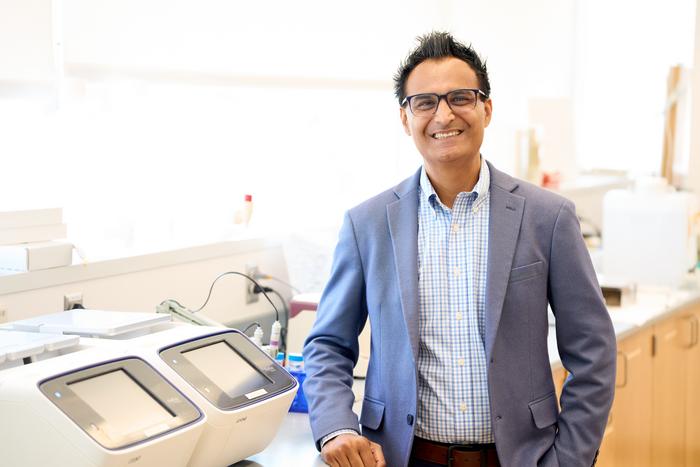Soybeans are the second most widely planted crop in the United States and play a critical role in the U.S. food supply. However, extreme heat and drought threaten to reduce soybean yields by 40% in the next 25 years.

Credit: Clemson University College of Science
Soybeans are the second most widely planted crop in the United States and play a critical role in the U.S. food supply. However, extreme heat and drought threaten to reduce soybean yields by 40% in the next 25 years.
“The planet is warming, and that has consequences on human life, either directly or indirectly, and on other lives, particularly plants, which provide food to 8-plus billion people across the globe,” said Shahid Mukhtar, a geneticist and professor in the Clemson University Department of Genetics and Biochemistry.
Mukhtar will lead a team of researchers in the Southeast — a region already disproportionately affected by the changing climate — studying how heat and drought affect soybeans, from the cellular level to the entire plant (known as single cell to field-based phenomics), and the associated microbial communities and soil. He and scientists from the University of Alabama at Birmingham, Mississippi State University and the Louisiana State University Agricultural Center aim to identify natural biological solutions through the microbiome that allow soybeans to survive and thrive despite extreme heat and drought.
The National Science Foundation will fund the research through a $6 million Established Program to Stimulate Competitive Research (EPSCoR) grant.
The NSF awarded $77.8 million to 14 projects, including the Interdisciplinary Program of Advancing Climate Extreme Resilience in Soybean (iPACERS) led by Mukhtar, who was a professor at UAB until assuming his current post at Clemson on July 1.
The EPSCoR Research Infrastructure Improvement-Focused EPSCoR Collaborations Program grants support interdisciplinary research teams working across jurisdictions to advance climate change research and build resilience in disproportionately affected communities nationwide.
“Every part of our nation has been impacted by the changing climate. We build a sustainable future for all by investing in climate resilience research and solutions across our country,” said NSF Director Sethuraman Panchanathan. He said the projects would drive innovation that fosters STEM opportunities, economic growth and climate-resilient communities.
The iPACERS team includes 14 diverse STEM researchers, educators, social and economic scientists, two extension specialists and outreach professionals.
During the four-year project, the iPACERS team will study two varieties of soybeans — one of which tolerates hot and dry conditions better than the other.
Mukhtar’s lab will focus on understanding the molecular mechanisms of how heat and drought impact individual cells in a plant through five growth stages.
Each cell in a plant has its own transcriptional signal, which determines its role in cellular processes. Mukhtar will study what signals changed in response to heat and drought by sequencing the RNA in greenhouse and field conditions.
“Cells have their own individual signatures, yet they are working together to respond to internal cues and diverse environmental stresses. We want to understand which type of signatures changed in response to heat and drought and why,” Mukhtar said. “Once we understand that, we hope to find a strategy to help the plants alleviate climate change-related stresses.”
Researchers at Mississippi State will focus on the aerial part of the plant. An agronomist, a plant physiologist and engineers will record environmental conditions and take images of soybean fields using drones and unmanned robotic vehicles. That will allow researchers to integrate weather data with the molecular data collected by Mukhtar’s team at Clemson using artificial intelligence and graph theory.
The focus of the researchers from LSU will be underground.
“One thing we’ve learned over time is that when there’s a drought or heat, the root architecture of a plant changes. And the microbiome of the soil also changes,” Mukhtar said.
Soybeans are legumes, and they team with bacteria in the soil to chemically convert nitrogen from the air into a form they can use. Legumes make nodules in their roots for these bacteria to live in.
“In extreme heat or drought, the size and the number of nodules decrease, which affects nitrogen fixation. When there’s less nitrogen for the plant, the crop yield decreases,” Mukhtar said. “We want to know what types of transcriptional signatures are happening in those nodules both in the host and the bacteria.”
The researchers will use artificial intelligence to integrate the data sets to identify microbes that can mitigate heat and drought stress by either offering direct protection or enhancing stress-responsive soybean physiology that can be field tested. Those bacteria could be applied to soybean crops through seed coating, spray or another method to boost yield.
Mukhtar said the study could be a model for other food crops, such as corn, the most widely grown crop plant in the United States.
In addition to the single-cell to whole plant research, the iPACERS project features a comprehensive, multi-pronged approach to develop a diverse STEM workforce in the South and educate the public about climate change and its impact on food security.



